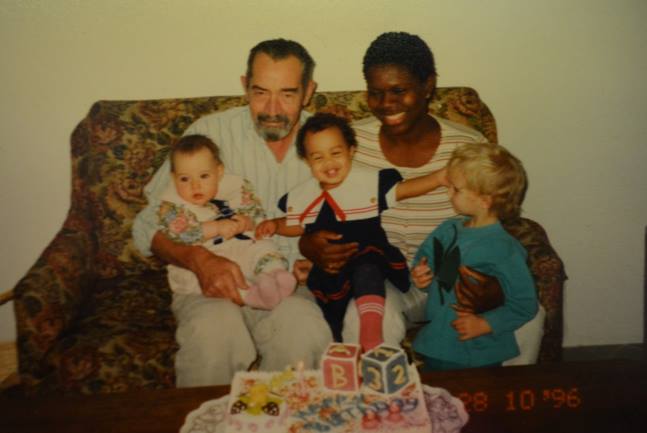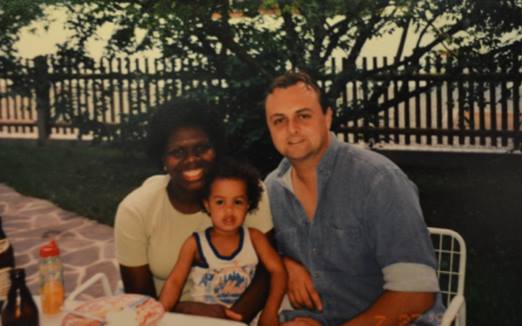Since November 2015, when I began coordinating bloggers for the Mixed Remixed Festival, fellow blogger Terri Rogers intrigued me. At age twenty-four, I’m still grappling with my many selves and seeking a sense of progressive direction. Terri graduated from high school in 2014, and she’s searching for her place in the world, too. But she’s much more Zen about the “adulting” quest than I am. Maturity isn’t necessarily tied to age, and I think we all need to learn from people like Terri. I hope the below interview enlightens you like it enlightened me.
- What do you like best about blogging for Mixed Remixed?
The creative freedom it gives me to truly write and share my experiences on what it means to be mixed. I am so happy to be part of a team with other writers and bloggers of varying backgrounds who are always inspired, motivated, and driven to constantly keep the conversation of “mixed-race” going. They truly inspire me to want to be a better writer and a greater team player. Having the opportunity to FREELY write about my personal journey for such a meaningful festival in this community is truly amazing and I’m beyond grateful.
- The cohesion among groups is often attributed to a shared experience or set of shared values. To what extent, if at all, do you think that there is a shared “mixed race experience” or “mixed-race values”?
I think that because many people, even within our own mixed families, have a hard time understanding our position and how we experience things a bit differently than they might—the shared “mixed-race experience” is just that: we get IT. We understand not fully fitting in on either side; being too “this” for that group or too “that” for this group and being very conflicted and unsure as to where we fit in this great big world. On the other hand, we also understand the beauty of growing up between two cultures and races (or whatever the mix happens to be) and being able to appreciate both sides and how that makes us all unique but also brings us all together—all at the same time.
- How did you learn about the Mixed Remixed Festival, and how did you first become involved?
I found a channel on YouTube by a blogger named Tiffany Jones, who had a series called “The Mulatto Diaries,” and she included a clip of the Mixed Remixed Festival with Karyn Parsons (Fresh Prince of Bel Air) and I remember thinking to myself: “How cool! There’s a place where mixed people can get together and just…embrace our ‘mixedness'”? I then Googled the festival and saw that you could volunteer on the blogging team and almost immediately, I sent an email with my interest and before I knew it, Heidi herself responded and before long we set up a Skype interview and the rest is history! Thank God for Tiffany! 🙂
- Where do you feel more freedom to be your “whole” self—in America, or in Germany? How do you think Europeans view race and “mixing” in contrast to how Americans seem to?
Well, to be honest, I’ve only been to America once in my entire life (say whaaat?). I remember being very nervous to visit my dad’s side of the family in Arizona for an irrational fear of rejection or some type of racial tension. To my everlasting surprise, it was one of the best trips ever—cousins I had never met wanted to take me to school with them for the day! It was one of the best feelings, just being considered part of the family—I felt silly for being so nervous! The overall trip was really great as well, I didn’t encounter the racism I thought was waiting for me. It was just my Afro-Caribbean mother and me (my dad couldn’t come) and they were all so open and were so happy to meet their “beautiful little cousin from Tobago.” In Germany, it’s been fairly mixed actually: some people genuinely don’t care about interracial relationships, while some tend to be slightly uncomfortable about them. Germany continues to become somewhat of a melting pot with people from neighbouring countries living here, so in the main cities, there isn’t a “strictly” German experience here—this has its pros and cons of course. I think, though, that Germans view race very simply, very black and white—the grey area isn’t often recognised; so in a sense the mixed community here is facing a similar issue but definitely not as “in your face” as it would be in the U.S.
From all the stories on social media as well as from films and news reports, America seems to have a major issue with mixing the races and “losing” some form of identity and the “purity” of a said race. I can’t deny the fact that some Germans also have a fear of becoming too multi-cultural and losing their identities in these changing times. Generally speaking though, I think Germany is much more open and are less overtly racist than you may find in the States. Now this is merely from my experience and what I’ve heard from Americans, as well as what I’ve seen and read in the media. It really depends on whom you meet. 🙂
- If you could give advice to your younger self regarding your ongoing search for a reconcilable identity, what would that be?
Don’t worry about it so much! Don’t let people’s curiosity and issue with “what” you are affect the way you see yourself and interact with others. Explore every aspect of yourself and let it come naturally—don’t force anything. Stay true to yourself, stay true to the “you” you were before you realised how heavy race was in our world. “Be soft. Do not let the world make you hard. Do not let pain make you hate. Do not let the bitterness steal your sweetness. Take pride that even though the rest of the world may disagree, you still believe it to be a beautiful place.” —Kurt Vonnegut
- What do you think holds more weight—culture, or the construct of race, and why?
That’s a really great question. I would like to say culture because in the Caribbean for example, it’s a huge melting pot. You have people of European, African, and Asian descent (and well everything in between) and over the years, our cultures have all merged and more or less become one: Caribbean. The Jamaican motto sums it up perfectly, “out of many, one people.” However, it would be naïve to say that we do not have issues related to race—because, sadly, we do. Culture tends to bring us all together on the surface and can at times, I’ve seen, be very superficial even. Another example could be white rappers: they may be part of the “culture” but still, there will almost always come a time when we have to mention the fact that said rapper is “white.” So I would definitely say that in a general, global sense, race definitely holds more weight: it’s seemingly the most identifiable and unmistakable of all traits and definitely has a role in shaping culture and its values.
Terri Rogers, everyone—what a wise young woman. You can follow Terri online, on her blog, One Love, and on YouTube.

